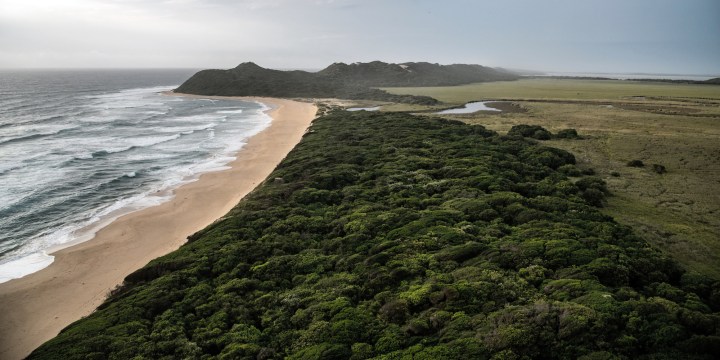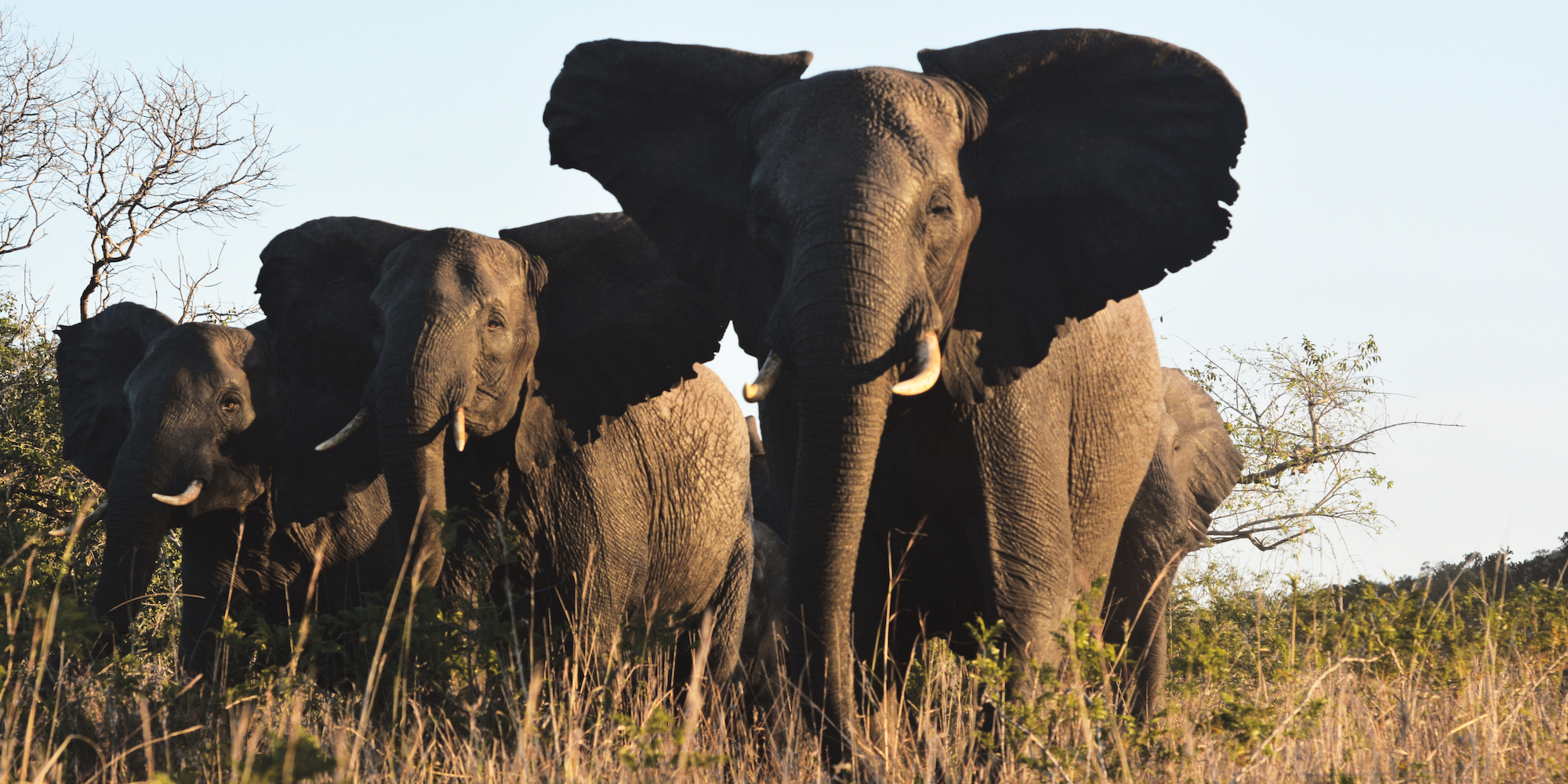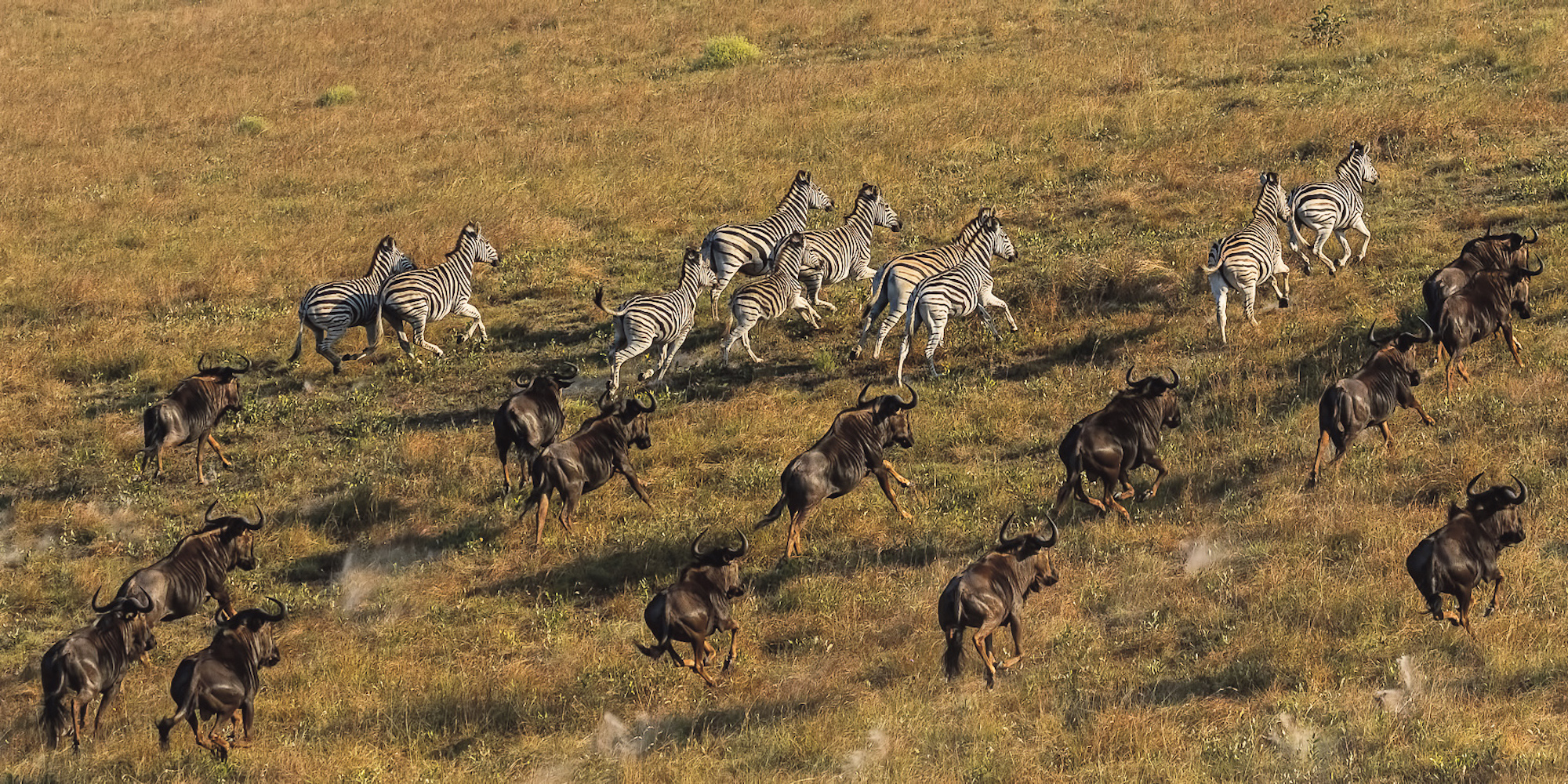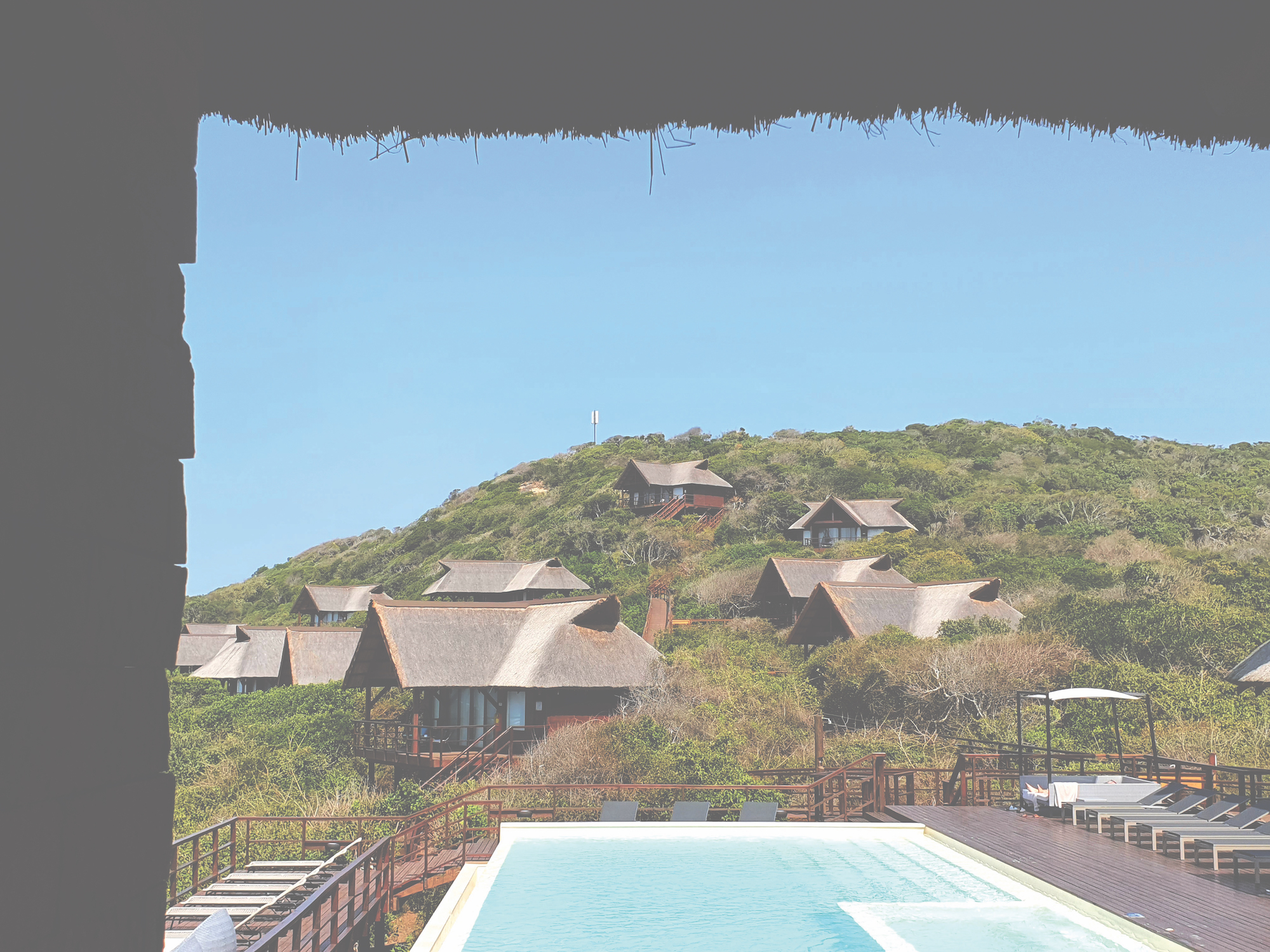OF LAND AND SEA
Maputo National Park — the paradise of elephants and whales

Home to both elephants and whales, the new park was proclaimed last year after Mozambique merged the Maputo Special Reserve with the Ponta do Ouro Marine Reserve. The park is a stunning bush and beach combo with a rich history and a brand new eco-lodge.
Many years ago I read Elephantoms by South African-born author Lyall Watson (published by WW Norton 2002) and call me sentimental and unscientific, but oh my, how it stirred me when he described an encounter he witnessed between a female elephant and a female blue whale in Knynsa.
“The matriarch was here for the whale”, he wrote. “The largest living animal in the ocean and the largest living land animal were no more than a hundred yards apart, and I was convinced they were communicating. In infrasound, in concert, in sharing big brains and long lives… these rare and lovely great ladies were commiserating over the back fence of this rocky Cape shore, woman to woman, matriarch to matriarch, almost the last of their kind. I turned, blinking away the tears, and left them to it. This was no place for a mere man…”
Alas, the Knysna elephants are no more, but I’ve never forgotten the profound possibility of an elephant-whale infrasound concert — and if it could have happened in Knysna, it may have happened too, right here in the new Maputo National Park. This newly proclaimed bush and marine park offers you the chance to see both elephants and whales and carry on the conversation over a caipirinha (classic Mozambique cocktail).
We had driven for half a day through this dreamy landscape of coastal lakes, wetlands, swamp forests, grasslands and mangrove forests and seen plenty of surprisingly chilled elephants — and now here we were sitting on a deck overlooking the Indian Ocean watching humpback whales lob and leap in the blue waters.

There are more than 400 elephants in the Maputo National Park. (Photo: Peace Parks)
What would elephants and whales talk about, we wondered? Fracking, poaching, civil war, human politics, habitat destruction, overfishing? Like so many places on the subcontinent, conservation is a battle against human greed, but this new national park offers sanctuary to a diversity of animals and hopefully, the conversation between whales and elephants can return to sharing the simple important pleasure of complex sociability.
The Maputo National Park is about 68km from Katembe — and the new Maputo-Katembe Bridge and the highway to Pont do Ouro makes it an easy 40-minute drive from the city. You know you’re getting closer when you see the elephant warning signs. We turned off into the park and drove with a flourish through the new gates and met our delightful guide Rodolfo Cumbane.
First up we had to lower the pressure on the vehicle’s tires. This 1,700 sq km park has predominantly sand roads and is strictly for 4x4s only. It was hot and steamy as we set off, sliding down and gearing up the undulating sand dunes with patches of woodlands and already, the sounds of hot and happy birds.
We saw our first herd of very relaxed elephants as the landscape opened out onto magnificent grasslands and marshes. At the last game count, said Rodolfo, there were over 400 elephants but he’s convinced there are more. These massive open floodplains can disguise numbers, as can the thick dune forests.
The Maputo National Park is good news for the elephants. It follows two decades of intensive development and restoration led by Mozambique’s National Administration for Conservation Areas (Anac) and the South African-based Peace Parks Foundation (PPF). The park was originally called the Special Elephant Reserve, explained Rodolfo, and was established in 1960 to protect the elephants. But as we all know, elephants and borders are a tricky thing. Historically, the elephants of northern KwaZulu-Natal and southern Mozambique moved freely around, but during the Mozambican war (1975-1992) these elephants suffered terribly from the war, from landmines, snares and gunfire.
The population was cut in half when the Tembe Elephant Park in SA was fenced off from the Mozambican side to try and safeguard the Tembe elephants. Amazingly, the remnant resident elephant population in the Maputo Special Reserve managed to survive the civil war, and the population is flourishing.

More than 5,000 animals have been
successfully translocated to the Maputo National Park in the past decade. (Photo: Bridget Hilton-Barber; Peace Parks)
Visit Daily Maverick’s home page for more news, analysis and investigations
The first steps towards restoring cross-border elephant movement began in 2000 with the establishment of the Lebombo Transfrontier Conservation Area, which opened up old movement corridors, including those along the Futi system and Rio Maputo floodplains. This dramatically increased the area available to the elephants and re-established traditional seasonal migrations.
In 2011, the Futi Corridor was proclaimed as an extension of the reserve and another 24 000ha were opened up, another huge step in restoring cross-border elephant movement.
And as for the whales, they are frequent visitors here, and a joy to behold. Peace Parks Foundation played a role in connecting the Ponta do Ouro Marine Reserve with South Africa’s iSimangaliso Wetland Park, a World Heritage Site, creating Africa’s first marine transfrontier conservation area, which hopefully will also become a World Heritage Site.
The beaches here are Mozambique’s most important nesting sites for endangered leatherback and loggerhead turtles, while the ocean is a fertile breeding ground for a dazzling array of other marine wildlife, like dugongs, various shark species and the largest aggregation of giant trevally in the world.
Maputo National Park teems with wildlife. In 2010, Anac and PPF began a massive wildlife translocation programme — a rewilding — which by 2022, saw the translocation of more than 5,000 animals into the park, including eight species that had become locally extinct during the country’s civil war. We saw journeys of giraffe, herds of zebra and wildebeest, we saw duiker, bushbuck, kudu, nyala and waterbuck. The fresh and saline coastal lake systems — the largest lakes being the Piti, Xinguti and Munde — are home to an impressive concentration of hippos and crocs and very carefully placed campsites and picnic spots.
There are floodplains, forests, grasslands and woodlands. In some parts, it feels like the Okavango Delta, in others the Serengeti. The diversity is beautiful and — fun fact — the park falls within the Maputaland-Pondoland-Albany Biodiversity Hotspot, one of the 36 most biologically diverse and endangered eco-regions on earth. It’s a bit like getting the conservation Oscar.
We arrived at Membene in the afternoon. This new eco-lodge is a real soul spot, with a series of contemporary cabins beautifully blended into the forest overlooking a stretch of white beach. The cabins are cool and airy, and you can park off and listen to the birds and the sound of the ocean. They’re really stylish and self-catering, and yes, there is a restaurant opening soon too — with decks and signature beach views — the perfect place for hopeless romantics like myself to entertain the possibility of whales and elephants having an upbeat convo.

Montebelo Milibangalala Bay Resort is a new and exclusive concession within the park. (Photo: Bridget Hilton-Barber;)
Membene also has a new campsite, with seven areas tucked into the trees, with showers and toilets and shaded braai areas. It feels ancient and profound, perfect for visitors who are after an unspoiled wilderness experience that includes both bush and beach.
An hour or so away from Membene is the new Montebelo Milibangalala Bay Resort, an exclusive hideaway for honeymooners and high-enders, and a concession in the park, whose opening was attended by the presidents of both Mozambique and Portugal. Thatched suites connected by wooden walkways, an infinity pool, a great menu, front row seas onto the humpbacks and dolphins with elephants close by. Heaven.
Further north is another lodge called Anvil Bay which is at Ponta Chemucane, a private and exclusive barefoot beach camp on a rare untouched stretch of coastal wilderness.
One of the loveliest things about travelling in Mozambique is that people here really seem to get tourism. Tourists are regarded with great delight and curiosity. Local buy-in means there are willing partners and opportunities for tour operators, guides, birders and conservationists.
It also means that poaching numbers are low. If there are lots of animals there are lots of tourists and there’s money. In Mozambique, 20% of the revenue generated by government conservation areas is shared with communities living in and around parks and reserves, so poaching when it happens is for the pot and not for profit. Nature-based tourism and conservation enterprises are part of the ethos of this park and it’s one of the most inspiring places to visit in southern Mozambique. DM168
Contact: Maputo National Park Tourism Dept
+258 (85) 600 0900 or
+258 (83) 333 6727
www.parquemaputo.gov.mz
Check out: www.peaceparks.org
Stay at: www.anvilbay.com www.montebelohotels.com
This story first appeared in our weekly Daily Maverick 168 newspaper, which is available countrywide for R25.





















 Become an Insider
Become an Insider
Wonderful Story – thanks Bridget